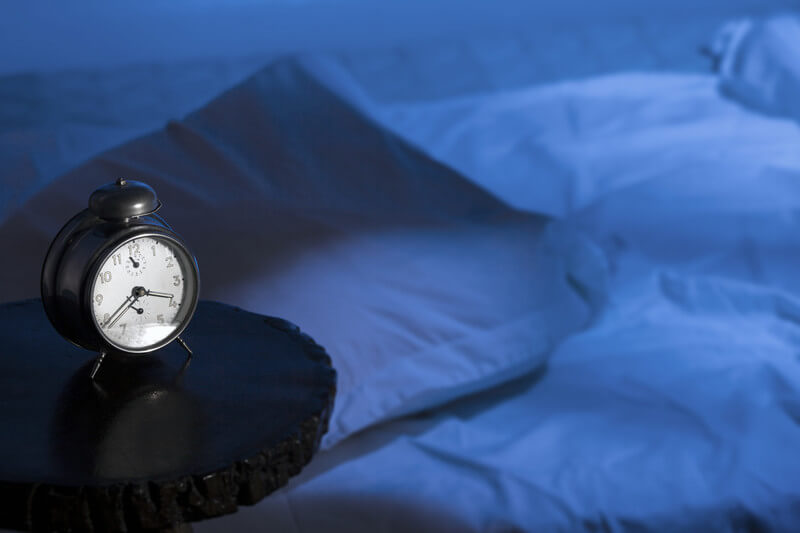Every purchase made online is encrypted with a high level of security you’ve come to expect. Your private information is never shared nor sold, so you can buy with confidence. You can also visit our store if you are in the St. Louis area.

Insomnia can be caused by both medical and psychiatric conditions as well as unhealthy sleep habits, substances, or biological factors. Oftentimes, insomnia is a state where your brain is unable to “turn off,” meaning that there is a problem with your internal sleep cycle and wake cycle.
Table of Contents
Medical Causes for insomnia
Medical causes for insomnia are lengthy and include:
- Sinus allergies
- Acid reflux
- Hyperthyroidism
- Arthritis
- Asthma
- Chronic pain
- Neurological conditions (such as Parkinson’s Disease)
Medications also may be the underlying cause for insomnia. If the insomnia coincides with a new medicine for allergies, high blood pressure, heart disease, birth control, or a similar condition, the sleep issue may be related to the new medication.
Insomnia may also be a symptom of an underlying sleep disorder, such as restless leg syndrome, narcolepsy, or sleep apnea.
Insomnia and psychiatric conditions
Sometimes psychiatric conditions, such as depression or anxiety, cause insomnia, and insomnia can bring on changes in mood similar to those felt in depression or anxiety. In addition, some medical conditions can cause both psychiatric responses and insomnia at the same time.
Studies have shown a link between depression and insomnia, one condition often creating or worsening the other. Anxiety can be intertwined in the mix, making matters even more unhealthy.
Most adults experience trouble sleeping because of worries at some point in their lives, but when it becomes a nightly issue, treatment may be necessary. Anxiety symptoms that result in insomnia often include:
- Tension
- Focusing on past events
- Excessive worrying about the future
- Feeling overwhelmed
- Feeling overstimulated
Individuals who experience insomnia due to anxiety for many weeks – or months – often begin to feel anxious at the prospect of trying to sleep, thereby compounding the effects of insomnia. Psychiatric conditions and insomnia often feed off of each other, becoming a cycle that is difficult to break.
Cognitive Techniques
Individuals who suffer from insomnia due to psychiatric conditions such as depression or anxiety may find relief through cognitive behavioral techniques, which include relaxation training, paradoxical intention, stimulus control, sleep hygiene, and cognitive behavioral therapy.
Relaxation Training
Sometimes called progressive muscle relaxation, relaxation training is the process of systematically tensing and relaxing the muscles of the body to induce sleep. Typically one works from one end of the body to the other until all of the muscles have been released. This exercise is a physical reminder to let go of tension.
Other forms of relaxation training include breathing exercises, mindfulness, guided imagery, and meditation. Some people prefer to listen to audio recordings, which guide them through the relaxation process.
Paradoxical Intention
The paradoxical intention method involves remaining passively awake and avoiding all efforts to fall asleep. Since worrying that you can’t sleep can keep you awake, this method helps you let go of that worry, thereby helping your relax and fall asleep.
Stimulus Control
Stimulus control helps make the bedroom a place of sleep by limiting the types of activities permitted there. The process builds an association between the bedroom and sleep, so that when you are in the bed, your body is prepared to sleep.
In stimulus control, you would not watch television in bed, eat in the bedroom, or even read or play on your phone in bed. You only get into bed when sleepy and get out of bed if you’ve been awake for longer than a specified time, such as twenty minutes. This exercise helps break the cycle of wakefulness in the bedroom and trains the body to recognize the bed as a place of sleep.
Sleep restriction is a form of stimulus control in which a person follows a strict sleep schedule with specified wake times. It limits the time in bed to only when the person is asleep.
Sleep environment improvement is a type of stimulus control which helps you create a soothing sleep environment. It may mean keeping your bedroom dark, quiet, and cool and hiding the clock from view.
Sleep Hygiene
Adjusting your sleep hygiene involves changing lifestyle habits which may affect your sleep patterns. For instance, drinking caffeine late in the day, consuming too much alcohol, or watching television before bed can all affect one’s ability to sleep. Sleep hygiene also provides ways to wind down before bedtime in preparation of a good night’s sleep.
Cognitive Behavioral Therapy (CBT)
CBT is a sleep restoration process that is completed with a sleep specialist. It starts with a baseline behavioral change, such as keeping a regular bedtime schedule, and adds a cognitive – or thinking – element. CBT challenges unhealthy beliefs or fears and teaches positive thinking to improve sleep behaviors.
Good Night’s Sleep
While insomnia may require medication to overcome, it could be taken care of through cognitive behavioral techniques. Unlike pills, these methods address the underlying cause of sleeplessness and aim to change one’s way of thinking and acting. Cognitive behavioral techniques put you in charge of your situation, allowing you to take an active part in achieving a good night’s sleep.
